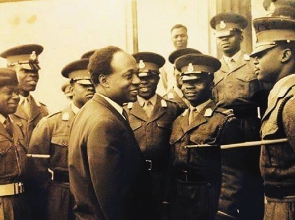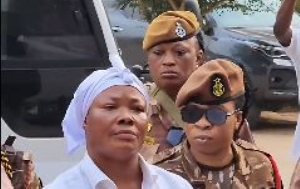It is no secret that a plot was hatched by a number of countries seeking to oust Ghana’s first president, Osagyefo Dr Kwame Nkrumah.
While detailed correspondents and accounts on the rationale behind his eventual overthrow in 1966 remain unsealed in secret files at the Central Intelligence Agency (CIA), some leaked documents over the years past have made it into the media space.
According to Risen Africa on YouTube, the CIA documents detail the close allies of Dr Kwame Nkrumah, members of his own government, security forces, the USA government, the UK government among others who all played a role in his eventual overthrow.
In February 1966, Dr Kwame Nkrumah was overthrown from office while he was on an international assignment in Hanoi, Vietnam. At the time, he was on a peace making trip over the Vietnam War, leaving a 3-person presidential commission in charge of the country.
His eventual overthrow was conducted by the National Liberation Council (NLC) with the code name “Operation Cold Chop,” bringing the entire country to a standstill.
Prior to his overthrow, Dr Nkrumah’s popularity had declined substantially in the mid 1961 following tax hikes, introduction of a compulsory savings system, a freeze on wages and salaries, large expenditures by government and other factors that were plaguing the country.
Portions of the unsealed documents, according to Risen Africa, showed that in the years leading to the coup, the United States of America began to withhold loans to Ghana impacting on the foreign exchange as well as lowering world cocoa prices through stockpiling measures in order to deprive Dr. Nkrumah of the much-needed financial backing in foreign exchange.
The next line of action was the deployment of the first African-American Ambassador to Ghana in the person of Franklin Williams.
In January 17, 1966, Williams presented his credentials to Nkrumah some few weeks before the coup took place. It is reported that Franklin Williams, before taking up his position as Ambassador to Ghana had exchanged correspondences with friends bragging about taking total control of the country.
Three weeks to the coup de’tat, an editorial piece was published in a newspaper named; 'The Spark', which was founded by Dr Nkrumah. It had the words written; “Why Would the US Send an African American Ambassador to Ghana When They Did Not Support Racial Equity in Their Own Country and Would Surely Not Send a Black Ambassador to a European Nation.”
This was based on speculation that Dr. Nkrumah saw the appointment as a sign of disrespect and felt the US was sending a Black Ambassador to ‘do their dirty work’ in Ghana.
Three days to the coup, Dr Nkrumah went to Hanoi, Vietnam on a peace making mission to negotiate a peaceful settlement to the US war with Vietnam.
The US government had earlier encouraged him to visit the country with a diplomatic mission with the promise that it would halt the bombing of North Vietnam in order to ensure his safety and others who were also on the mission.
While this is taking place, some 600 Ghanaian soldiers, who were stationed at the Northern barracks were given marching orders to proceed down to the South of the capital in Accra.
They made a 435-mile (700 km) journey with the intention of mobilizing in response to the situation taking place in Southern Rhodesia which is now known as Zimbabwe. Upon their arrival, the coup leaders told the soldiers that Nkrumah was meeting with Vietnam leader, Ho Chi Minh in preparation for their deployment to the war-torn country.
Shortly after, the coup leaders informed the soldiers that they were going on a mission to fight against the white nationalist movement led by Ian Smith in Zimbabwe. They [coup leaders] were however able to rile up the soldiers in believing that Nkrumah’s administration was abusive and corrupt, giving them the justification to oust him from office.
The soldiers were then divided into various numbers who then went on to capture key members of the government and its allied institutions including the national broadcasting house and the international communications building.
The heaviest fighting however took place at the Jubilee House, the seat of the presidency where General E.A Kotoka vowed to bomb the entire building. This then forced the first lady Fathia Nkrumah to request that the guards at Nkrumah’s residence surrender.
At dawn of February 24, 1966, the coup leaders made the announcement to the entire nation on Nkrumah's overthrow.
Despite his overthrow, Dr. Kwame Nkrumah's unwavering commitment to Ghana's progress and his belief in the potential of the Ghanaian people were evident in his speeches, books and memoirs.
He rallied his fellow countrymen to stand strong in the face of adversity and work towards securing both political and economic independence.
The legacy of Dr. Kwame Nkrumah as a visionary leader and advocate for African liberation continues to inspire generations.

MA/DA
General News of Saturday, 15 July 2023
Source: www.ghanaweb.com













